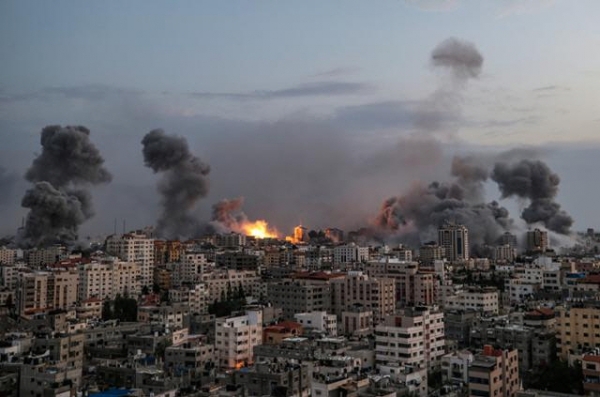U.S.-Iran proxy war 'close' to escalating
U.S. to step up monitoring
"Iran not a major oil importer...
Global political flows to establish countermeasures
 |
| ▲이스라엘의 대대적인 보복 공습이 이어진 9일 팔레스타인 가자지구 가자시티 전역이 화염과 연기에 둘러싸여 있다. (EPA연합뉴스) |
The war between Israel and the Palestinian militant group Hamas is in full swing, and South Korea's oil refining industry is on high alert. Refiners are preparing to take measures as they expect the armed conflict to hit oil supplies if it turns into a proxy war between the United States and Iran.
The war has been raging for three days after Hamas launched a surprise attack on Israel on July 7 (local time). So far, more than 800 people have been killed on the Israeli side and more than 600 on the Palestinian side of the Gaza Strip. Casualties have also been high in Gaza, which has been under intensive air strikes since Israeli Prime Minister Benjamin Netanyahu declared war on Hamas.
The price of West Texas Intermediate (WTI) crude oil for November delivery settled at $86.38 a barrel on the New York Mercantile Exchange on Sept. 9, up $3.59, or 4.34 percent, from the previous session, according to a report. This was the highest in three days ($89.23) at the close.
Dubai crude, which South Korea mainly imports and serves as a benchmark for Middle East crude prices, rose 2.65% to $88.54. Brent crude oil jumped 3.57% to close at $88.15.
Before the Israeli-Hamas war, international oil prices had been slow to rise, but once the war broke out, they jumped sharply. As Israel and Palestine are not oil producers, the impact on the oil market is limited, but the possibility of a proxy war between the US and Iran cannot be ruled out.
"If it turns into a proxy war between the two countries in the long run, it could cause energy inflation," said Yoon Jae-sung, a researcher at Hana Securities. "The war is not only about political issues between Israel-Palestine and Saudi Arabia-Israel, but also about energy hegemony over Israel's natural gas development and the East Mediterranean offshore gas pipeline."
Iran's presence in the oil market is also growing. Iran's crude oil production recently exceeded 3 million barrels per day, and its crude oil exports are estimated to be close to 1.2 million barrels per day.
"Risks remain, such as a future blockade of the Strait of Hormuz and an Israeli attack on Iran's oil infrastructure," said Yoon. "The recent US-Saudi military agreement also remains to be seen," he added.
In response, the oil industry is on high alert with increased monitoring. It is said that they are constantly monitoring the situation and are keeping an eye on the safety of ships traveling to and from the Middle East and the smooth transportation of crude oil and petroleum products. However, there is nothing unusual at this time.
"There have been some fluctuations in crude oil market transaction prices, but there is no impact on supply yet," said an official from the oil refining industry. "Iran is not a major importer of crude oil, so we will monitor and respond to trends in neighboring countries such as the Middle East."

Israel-Hamas war in full swing...oil industry nervous of 'sparks flying'
The war between Israel and the Palestinian militant group Hamas is in full swing, and South Korea's oil refining industry is on high alert.
Comments
Post a Comment